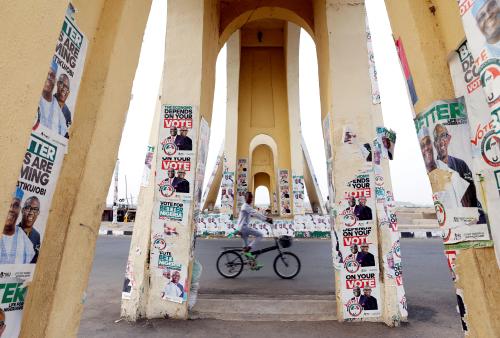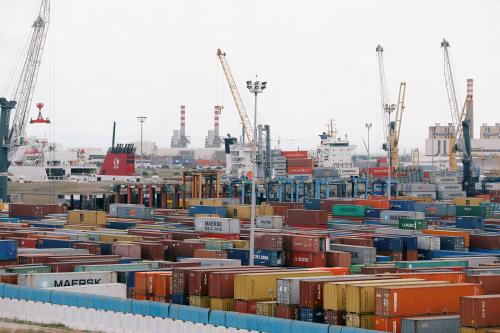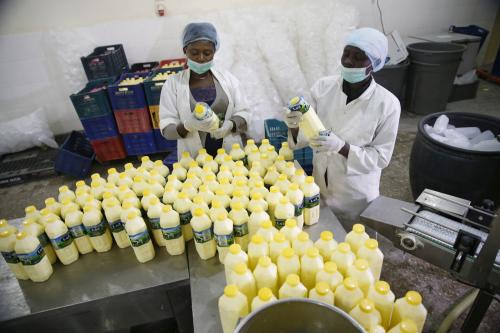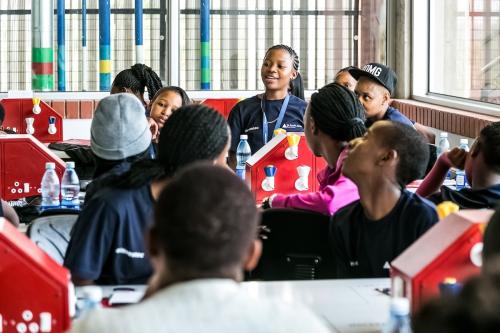General elections were scheduled to take place in Nigeria on February 16, 2019, to elect the president, vice president, and members of the National Assembly. These elections were expected to be the sixth quadrennial elections since the end of military rule and the beginning of the country’s transition to democratic governance in 1999. The elections were postponed until Saturday, February 23, 2019, and four days later the country’s Independent National Electoral Commission officially declared incumbent President Muhammadu Buhari as the winner with 56 percent of the votes to opposition leader Atiku Abubakar’s 41 percent.
Abubakar rejected the election results, arguing that the election was a “sham” and that the incumbent’s win was a “statistical impossibility” in some states. He also lamented what he referred to as the “militarization of the election process” and went on to say that he would take his case to the courts. Nigeria is already a country struggling to deal with election-related violence. How Abubakar and his supporters deal with the loss could have a significant impact on peace and security in the country as it moves on to deal with pressing public issues, particularly, how to end extreme poverty.
THE HISTORY OF DEMOCRACY IN NIGERIA
Since gaining independence from Great Britain in 1960, Nigeria has struggled to develop a culture of democratic governance. Hopes that independence would usher in a new political order characterized by democratic governance and constitutionalism were dashed on January 15, 1966, when a group of mutinous soldiers led a brutal coup d’état that ended the country’s First Republic and continues to haunt the country to this day.
After years of further coups and elections pervaded with fraud and other irregularities, the general elections held on March 28–29, 2015, marked a turning point in Nigeria’s transition to democratic governance and constitutionalism. The exercise pitted Muhammadu Buhari of the All Progressives Congress (APC) against incumbent Goodluck Jonathan of the People’s Democratic Party (PDP). Jonathan, who was seeking re-election, was the leader of the party that had ruled the country virtually unopposed for 16 years.
Buhari captured 53.96 percent of the votes cast in the 2015 election to Jonathan’s 44.96 percent, effectively ending the PDP’s nearly two-decade hegemonic control of the government. While there were pockets of violence throughout many parts of the country, it was generally believed that Jonathan’s decision to concede paved the way for a peaceful transfer of government and minimized violence.
LEAD UP TO THE 2019 ELECTIONS
In postponing the election, the chairman of the electoral commission, Mahmood Yakubu, indicated that the commission had undertaken a “careful review of the implementation of the logistics and operation plan” and that in order “to conduct free, fair, and credible elections,” it had come “to the conclusion that proceeding with the election as scheduled [was] no longer feasible.”
Critics of the commission’s decision to delay the vote say that the postponement was probably part of the incumbent government’s effort to manipulate the poll to its advantage. At the very least, the sudden postponement created, in the minds of many people—especially those in the opposition—the appearance of unfairness and corruption.
Another government action that created the appearance of unfairness was the suspension, by President Buhari, of Chief Justice Walter Onnoghen. This was extremely troubling, given that the chief justice is constitutionally empowered to play an important role in the resolution of electoral disputes. Both domestic and international actors have “taken serious issue” with the chief justice’s removal just three weeks before the election, arguing that it could “cast a pall over the electoral process.”
There were other threats to the elections as well. First, the Boko Haram offshoot, the Islamic State West Africa Province, was suspected of having orchestrated attacks in Northeast Nigeria, forcing many people, including potential voters, to flee the area hours before the polls were supposed to open. Second, in the country’s central states, nomadic herdsmen and farmers continue to battle each other for access to dwindling arable land and water. Third, tensions in the Niger Delta remain high as the region suffers from extreme poverty and desolation. In fact, despite its enormous oil wealth, Nigeria remains the country with the largest number of citizens living in extreme poverty. Fourth, bureaucratic corruption, which has contributed not only to increased poverty in the country but has also been identified as a major contributor to human rights violations, remains high. Finally, Boko Haram’s nearly 10 years of violence has created humanitarian crises in various villages in Northeast Nigeria and in parts of Cameroon, as many people flee from their homes in search of shelter in other regions of the country. Coupled with droughts, the displacement of thousands of people has created a major challenge to conduct credible elections.
Buhari was elected with a mandate to deal with these threats to national peace and security. Unfortunately, many of the issues that brought Buhari to power remain unresolved.
THE RESULTS OF THE 2019 ELECTIONS
While it is true that pockets of violence and several irregularities marred the election, many observers believe that these problems had not been widespread enough to seriously undermine the outcome. However, Abubakar’s challenge of the legitimacy of the elections poses a threat to stability. The opposition leader, of course, has the right to dispute the election results. Nevertheless, Abubakar and his supporters must do so peacefully through legal avenues provided by the country’s constitution. Buhari and Abubakar must advise their supporters to remain peaceful and allow the courts to resolve all election-related issues and accept the decision of the Supreme Court as final.
However, if the dispute over the results eventually reaches the Supreme Court, there could be a problem. The opposition could argue that the decision to remove Justice Onnoghen was politically motivated and designed to secure court leadership more likely to favor President Buhari.
THE ROAD AHEAD FOR NIGERIA AND A SECOND BUHARI TERM
Ending extreme poverty must be a top policy priority for Nigerians and the new government. The country has the capacity to deal effectively with poverty: large endowments of natural resources, especially oil; a young and highly educated population; and many people adept at entrepreneurship and the creation of wealth.
Nevertheless, there are many threats to the creation of wealth. Two of them stand out: widespread corruption and the absence of peace and security in many regions. Corruption, like embezzlement of public funds, has plagued Nigeria since independence. Buhari came to power in 2015 promising to clean up corruption and restore professionalism in the public services. Although he appears to have made significant progress in that fight, his critics say that he only targeted his political opponents and ignored his allies and supporters. Still, many Nigerians give him credit for his efforts and for not illegally amassing wealth for himself. To deal more effectively with corruption, Buhari must now significantly improve openness and transparency in government communication, especially with respect to government procurement programs.
The Buhari government also needs to deal with extremism and other threats to peace and security like Boko Haram and the lawless armed gangs who roam parts of the country kidnapping people and holding them for ransom. This must be done not just through military action but also by providing opportunities for young people, especially in the rural areas, for self-actualization.
Finally, the government must address the issue of lack of basic infrastructure for development: passable roads, adequate and reliable power, water treatment plants (access to clean drinking water is a major problem for most communities), basic health care, affordable housing (especially in urban areas), police protection, and other services that can enhance the ability of citizens to live in peace.
Posterity will judge Buhari and his government by how well they use the opportunity granted to them by Nigerian voters to make peace, security, and prosperity possible for their fellow citizens.
The Brookings Institution is committed to quality, independence, and impact.
We are supported by a diverse array of funders. In line with our values and policies, each Brookings publication represents the sole views of its author(s).








Commentary
The 2019 Nigerian elections and Buhari’s second chance to provide peace, prosperity, and security
March 1, 2019